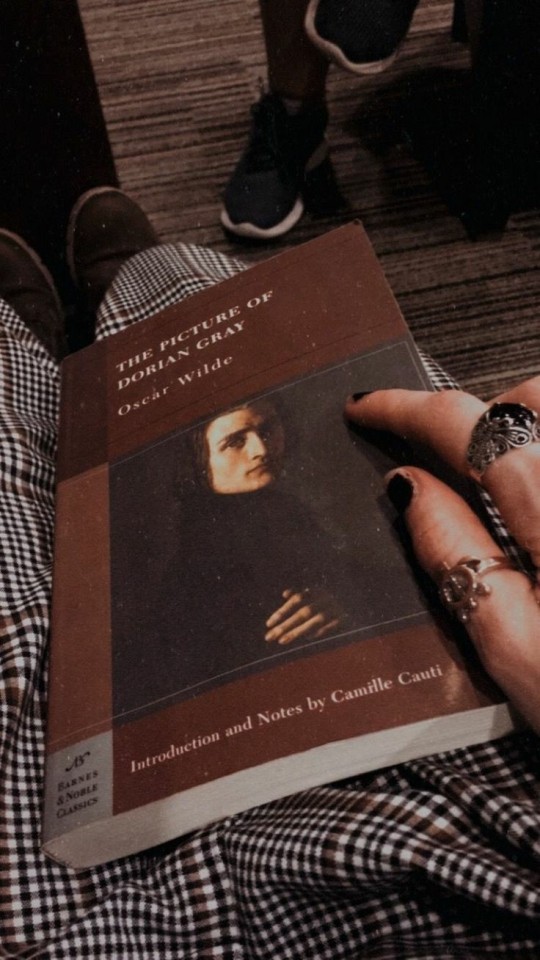The Forest By Nikita Gill

The Forest by Nikita Gill
More Posts from Ad-meliora-tendo and Others
Books To Read For The INFJs

The Secret History by Donna Tartt
Little Women by Louisa May Alcott
The Picture Of Dorian Gray by Oscar Wilde
And Then There Were None by Agatha Christie
Circe by Madeline Miller
To Kill A Mockingbird by Harper Lee
Pride and Prejudice by Jane Austen
Recitatif by Toni Morrison
The Bell Jar by Sylvia Plath
Eleanor Oliphant Is Completely Fine by Gail Honeyman
The Book Thief by Markus Zusak
The Lord Of The Rings by J.R.R. Tolkien
Of Mice and Men by John Steinbeck
Jane Eyre by Charlotte Brontë
Neverwhere by Neil Gaiman





harry potter series: light and dark
we’ve all got both light and dark inside of us. what matters is the part we choose to act on.
guide to being the dark academic you’ve always aspired to be
1. stand in the middle of a lake staring at the way the moonlight reflects off the blood on your hands
2. start using words with more syllables because it sounds smarter and you need everyone to know how smart you are so they won’t know you bribed your way into the gentleman’s club
3. cover your chin with a black scarf so people can’t see the scar you got from turning the pages of the encyclopaedia too quickly
4. clutter your room with things that you bought from old charity shops, so you can watch them collect dust (and so you won’t have to look at that mysterious red stain on the floor)
5. buy a coffin to sleep in (you can find one secondhand if it’s too expensive - don’t worry, that just adds to the mystique).
6. string balls of cosy yarn across the floor, lest any intruders come. this way, you can catch them easily.
7. spell your name wrong to prevent identity theft
8. cut all your hair off in an attempt to become someone else and then send the locks to your neighbours (don’t provide context)
9. dig yourself a grave four feet to the left of the nearest skyscraper
10. don’t look behind your shoulder or you’ll see her. donna.






English literature academia aesthetic appreciation post.
subjects as dark academia aesthetics
english: knit turtlenecks, corduroy pants. going to stationery stores and buying ink. writing notes and penning stories in leather-bound notebooks. critiquing your friend’s essay as you walk hurriedly through a grove of oak trees in the rain on your way to class.
math: perpetually foggy glasses. biting your pencil eraser to focus when you’re stuck on a particularly difficult problem. taking notes and putting them into a worn binder, bursting with variegated papers. late night study sessions fueled by multiple cups of black tea.
chemistry: heavy old textbooks covered in post-it notes. empty beakers sitting in the windowsill, reflecting random patterns of light onto the classroom walls. a cozy striped sweater peeking out from underneath a pristine white lab coat. coffee from the local cafe, filled just to the brim with creamer - very precisely, a skill learned from hours spent measuring chemicals.
history: dark woolen coats, long socks hidden under plaid pants. old maps from all across the glove hung around the room. analyzing (and admiring!) prolific writing and pieces of art that have survived the test of time. long walks on cobblestone streets, stopping to read on the steps of a museum.
latin: sturdy leather backpacks with straps. stopping to explain the meaning of words and their roots, followed by looks of intrigue. writing latin sayings into tea-stained planners. sitting in a cafe, eating a macaron in a window booth and watching people walk by.
art: hair pulled back into a low bun, random strands poking out. hands always stained with paint, charcoal - the medium changes daily. sketching under a sycamore tree, its leaves slowly browning. standing in front of a painting in a museum, becoming lost in it, slowly pulled back in time into its story.
MBTI Booklist! (Credit : @Indepth_mbti)
















I really like reading! I want to recover all mi MBTI’s books I don’t know! :D


i got an old book about the greek language for 1$ today :)

A romantic is a person who believes in romanticism, which is like a philosophy on life.
Romantics love nature, old things like castles and churches, love poetry and beauty, and have a tendency to get carried away by ideas. This can be both bad and good, as most of the original romantics stood up for their beliefs and greatly helped England, but also went to help people in revolutions and got killed.
They also tend to get randomly depressed, but this is because the weather and colors and beatiful things make them act differently than others.
omg i’m crying i can’t believe i found some valid information on what has been disturbing me for such a long time. i felt like i didn’t belong to the language i speak and.. jeez here it is, i’m not alone
All I can think abt is that one quote that basically just describes that you can’t be your true self in your native language bc there’s too much emotional attachment, but that second languages allow speakers to be truly free with their words










Adapted from a workshop I did at my high school Writing Center. One of my more helpful powerpoints; let me know if you need any clarifications. This is all my original work; please don’t remove the source.
-
 lilacmuse liked this · 3 years ago
lilacmuse liked this · 3 years ago -
 nyctophilia--a reblogged this · 4 years ago
nyctophilia--a reblogged this · 4 years ago -
 nyctophilia--a liked this · 4 years ago
nyctophilia--a liked this · 4 years ago -
 becckksss liked this · 4 years ago
becckksss liked this · 4 years ago -
 onaflamingpie liked this · 4 years ago
onaflamingpie liked this · 4 years ago -
 itswildwinters reblogged this · 4 years ago
itswildwinters reblogged this · 4 years ago -
 love-andthe-laughter reblogged this · 4 years ago
love-andthe-laughter reblogged this · 4 years ago -
 martinaamariiaa reblogged this · 4 years ago
martinaamariiaa reblogged this · 4 years ago -
 martinaamariiaa liked this · 4 years ago
martinaamariiaa liked this · 4 years ago -
 zendayasgirlfriend reblogged this · 4 years ago
zendayasgirlfriend reblogged this · 4 years ago -
 zendayasgirlfriend liked this · 4 years ago
zendayasgirlfriend liked this · 4 years ago -
 bluelotuspetalsugar liked this · 4 years ago
bluelotuspetalsugar liked this · 4 years ago -
 dainty-ixora liked this · 4 years ago
dainty-ixora liked this · 4 years ago -
 dainty-ixora reblogged this · 4 years ago
dainty-ixora reblogged this · 4 years ago -
 moonbeam-murmurs liked this · 4 years ago
moonbeam-murmurs liked this · 4 years ago -
 timidfaerie reblogged this · 4 years ago
timidfaerie reblogged this · 4 years ago -
 nuit-lucifere reblogged this · 4 years ago
nuit-lucifere reblogged this · 4 years ago -
 nuit-lucifere liked this · 4 years ago
nuit-lucifere liked this · 4 years ago -
 thewitchlandz liked this · 4 years ago
thewitchlandz liked this · 4 years ago -
 infernalmortallove reblogged this · 4 years ago
infernalmortallove reblogged this · 4 years ago -
 snailpace liked this · 4 years ago
snailpace liked this · 4 years ago -
 burgundygemstone reblogged this · 4 years ago
burgundygemstone reblogged this · 4 years ago -
 burgundygemstone liked this · 4 years ago
burgundygemstone liked this · 4 years ago -
 parmisaanowl reblogged this · 4 years ago
parmisaanowl reblogged this · 4 years ago -
 its-ribena-frog liked this · 4 years ago
its-ribena-frog liked this · 4 years ago -
 dopescienceonaesthetic liked this · 4 years ago
dopescienceonaesthetic liked this · 4 years ago -
 moonkissed-rambler reblogged this · 4 years ago
moonkissed-rambler reblogged this · 4 years ago -
 sr-vile-blog liked this · 4 years ago
sr-vile-blog liked this · 4 years ago -
 mooseymamallamajoe reblogged this · 4 years ago
mooseymamallamajoe reblogged this · 4 years ago -
 the-invisible-girlnow liked this · 4 years ago
the-invisible-girlnow liked this · 4 years ago -
 angi-maximoff liked this · 4 years ago
angi-maximoff liked this · 4 years ago -
 lowlandforest liked this · 4 years ago
lowlandforest liked this · 4 years ago -
 amotoquinha liked this · 4 years ago
amotoquinha liked this · 4 years ago -
 elangelraphael liked this · 4 years ago
elangelraphael liked this · 4 years ago -
 quarantine-stories liked this · 4 years ago
quarantine-stories liked this · 4 years ago -
 elisedarling reblogged this · 4 years ago
elisedarling reblogged this · 4 years ago -
 elisedarling liked this · 4 years ago
elisedarling liked this · 4 years ago -
 innerbearquack-blog reblogged this · 4 years ago
innerbearquack-blog reblogged this · 4 years ago -
 innerbearquack-blog liked this · 4 years ago
innerbearquack-blog liked this · 4 years ago -
 shitaliann liked this · 4 years ago
shitaliann liked this · 4 years ago -
 gigiluh liked this · 4 years ago
gigiluh liked this · 4 years ago -
 snailpace reblogged this · 4 years ago
snailpace reblogged this · 4 years ago -
 pissbabie888 liked this · 4 years ago
pissbabie888 liked this · 4 years ago

dark academia | xxi | ♂| INFJ-T | oct.24 — active
192 posts